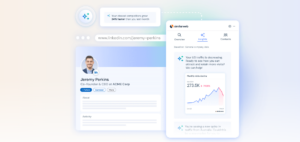by Ken Fitzpatrick, CEO of The Digital Marketing Institute
According to research by Hays, over half of marketing professionals are willing to adopt artificial intelligence (AI) into the workplace over the next year, and 43% of marketers expect AI tools to positively impact their job. In fact, Mailchimp found that 50% of marketers believe inadequate adoption of the technology is holding them back from achieving their goals.
Despite this willingness to embrace the technology, the same Hays research found that most marketers aren’t currently using AI tools, due to a general lack of awareness or understanding of the technology’s benefits.
But AI can be an important addition to a marketer’s arsenal when used correctly – particularly in this industry, where keeping up with trends and technological advancements is key to ensuring brands remain competitive.
For instance, the technology can be used to identify and analyse audiences and target groups, allowing brands to match products or services to the most relevant consumers. This can also help brands and marketers to segment the audience and provide separate, tailored content to each.
As well as optimising marketing campaigns, AI can provide analysis to campaign results, simplifying the reviewing and reporting process. The technology also has the capability to improve e-commerce opportunities, enhance the SEO of brands and products, provide 24-hour chatbot services and generate content, among many other uses.
But one of AI’s most popular, and arguably important, uses currently is its ability to improve the customer experience, by tailoring and personalising content based on the individual.
Netflix, for example, uses AI-driven machine learning technology to provide personalised recommendations based on what users have enjoyed in the past. Netflix also uses an AI development to automatically optimise streaming quality and avoid any quality or buffering issues. Because of automations like these providing a seamless user experience, people, rightly so, are demanding more value than ever from the brands they engage with and spend money on.
It’s no surprise then, that AI is the most sought-after skill marketers are looking to develop in the next 12 months, according to our Digital Marketing Institute research, reflecting the need to shape it into a specialism within the industry. In fact, HubSpot’s State of AI survey found that 62% of marketing leaders and 66% of business leaders have already hired new employees to help leverage AI/automation tools.
On top of this, a study from Oxford Internet Institute found workers with artificial intelligence skills are ‘particularly valuable’, and command salaries 21% higher than average, but potentially up to 40% higher – one reason being that these can be combined with other valuable skills.
So, the ability to use AI to revolutionise the digital marketing strategy is clearly in high demand. But how can we ensure that those marketers who want or need to use AI have the skillset to do so?
Upskilling across the business
To capitalise on the benefits that AI adoption can bring to businesses, upskilling marketers and existing staff is crucial – particularly given the pace at which the technology is evolving. But there’s often a misconception that upskilling and training programmes are predominantly reserved for junior levels, or those earlier on in their careers seeking to hone their skills. However, ensuring all levels understand how AI can support and improve their marketing strategies is key to the successful adoption of the technology.
AI has shown us why it’s so important that marketers continue to upskill throughout their career to make the most of new technologies that are coming through. Training – whether that’s on-the-job, external or additional – is extremely beneficial to both the business marketers work for, as well as the individual.
For the business, employers can feel confident that their team is up to date and well versed with any developments or new skills to enhance their work. Ongoing training and development has also proven to support staff retention, allowing employees to refine their skills, work towards personal and workplace objectives, while clearly showing managerial investment in their career development.
Meanwhile on an employee level, undertaking training and certification is a true value add, allowing marketers to stand out among their peers within the industry. According to the Digital Marketing Institute Corporate Skills Gap Survey, 75% of employers say they are more likely to hire candidates with a DMI certification on their CV, while our 2022 Graduate Survey found that 79% of DMI graduates said that they got a promotion within six months after completing a Digital Marketing Institute course. This reflects the benefits of enrolling in a training course and gaining the certification, and the value this has on career development.
Upskilling and learning how to use AI is hugely beneficial in today’s digital marketing landscape. Being equipped with these tools allow marketers to gain deeper insights into consumer behaviour, preferences, and trends, enabling the creation of highly targeted and personalised marketing campaigns.
AI-driven analytics can also predict future buying patterns, providing businesses with a competitive edge by anticipating market changes and customer needs. Furthermore, AI tools streamline operational efficiency by automating repetitive tasks, such as customer segmentation and campaign management, freeing marketers to focus on creative and strategic initiatives. The result is not only a more dynamic and responsive marketing approach but also enhanced customer experiences and loyalty, ultimately driving business growth and profitability.









